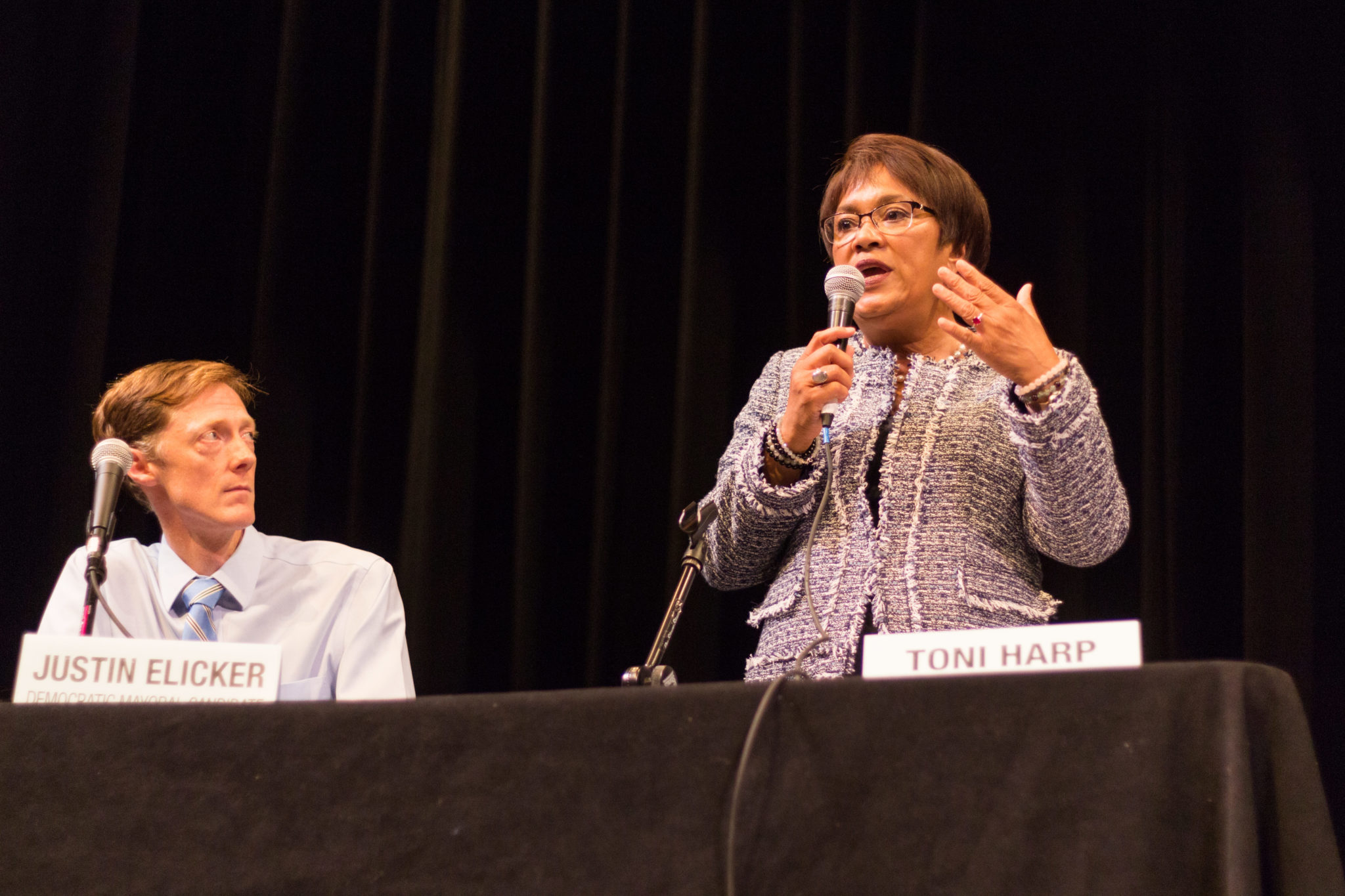
Daniel Zhao
After facing off in a contentious forum in Sudler Hall last Friday, mayoral candidates Justin Elicker FES ’10 SOM ’10 and Toni Harp intensified their clash in a fiery debate downtown, just days before the city’s highly anticipated primary election.
On Thursday, incumbent Harp and Elicker participated in a mayoral forum hosted at New Haven’s Cooperative Arts and Humanities High School. The New Haven Independent, the Spanish-language news platform La Voz Hispana, the League of Women’s Voters and the New Haven Democracy Fund — the city’s public financing initiative — co-hosted the debate in front of an overflowing crowd of a little over 300 people. The hopefuls answered questions about their policies and platforms, but also butted heads over several highly emotional topics in front of an audience that often expressed its own sentiments by loudly cheering, booing and heckling as candidates delivered answers.
“My administration has given room and a place for everyone to participate,” Harp told a receptive audience. “We have moved New Haven forward. There is still more work to do, but I want to work with each and every one of you.”
Harp, who is seeking a fourth term, and Elicker — previously the executive director of the New Haven Land trust and former East Rock Alder — answered questions proposed by a panel of local journalists, including Paul Bass of the New Haven Independent and Mary O’Leary of the New Haven Register.
The evening got off to a contentious start, with the first question touching on the city’s financial accountability and future. Harp defended her administration’s record and cited improvement in New Haven’s poor financial standing. On the other hand, Elicker sounded the bell and warned that the city needed to correct its financial pattern before it courted bankruptcy or lost its own fiscal autonomy to the state.
New Haven, like many of Connecticut’s cities, has struggled with its finances in recent years as costs and interest payments soared and sources of revenue stagnated. The city took on its largest ever restructuring of debt last summer — alongside an 11 percent increase in taxes that Elicker critiqued and Harp defended as difficult but necessary.
Elicker criticized the Harp administration’s fiscal choices and lack of transparency. He is participating in the Democracy Fund — which caps individual donors at $390 instead of the otherwise legal limit of $1000, and provides conditional matching funds. Harp has never participated in the Democracy Fund. On Thursday, he touted his clean fundraising as representative of the clean leadership he envisions in City Hall.
Harp denounced the Democracy Fund as a system that “rewards people at the higher end” and said that “only the very wealthy from wealthy neighborhoods” reap the benefits of the Democracy Fund. The system, she said, is “stacked against poor people.” Elicker responded immediately thereafter, expressing his disappointment with the mayor’s characterization — to the sound of loud audience boos.
Elicker has repeatedly characterized Harp and her administration — which has seen several staffing and expenditure scandals in the last term — as ineffective and corrupt. Harp acknowledged some mistakes, noting her firing of individual staffers, but also characterized Elicker’s criticism on her administration as a critique of the city’s civil servants and staffers.
The forum’s explosiveness continued, with the pressure of the upcoming election clearly pressing both candidates. In response to a question about Spanish language education and bilingual education in public schools from La Voz Hispana reporter Carlos Resto, Elicker delivered his full response in Spanish, elaborating on the importance of accessible education for all.
Resto focused in on several key questions for the Hispanic and Latinx community, asking about education and New Haven’s immigrant-related policies, given the anti-immigrant rhetoric in the federal government. He asked Harp if the Elm City should “continue to be a sanctuary city,” an important question for local activists.
Harp’s response was that the city should continue to be a “welcoming” city but did not directly address the designation of “sanctuary.”
The race also involved discussion over more technical questions on zoning, parking lot expansion and the question of Tweed airport’s future. In their closing statements, each candidate refrained from attacking their respective opponent, instead pleading with the audience to support them.
Elicker — who debuted his first television ad this morning — referenced his daughter Molly’s first day of school and drew a parallel, noting that while he does “respect and admire” Harp’s work in the city, it was time for more progressive, transparent leadership.
“New Haven is at a moment where we’re ready for a new stage, a new type of government and leadership that’s more accessible and more responsive.”
The majority of the audience members at the debate were avowed Harp supporters. Many carried yard signs and cheered loudly for the mayor throughout the night. In her closing statement, Harp appealed to working together with the entire community and was drowned out by cheers.
The mayoral primary is on Sept. 10.
Angela Xiao | angela.xiao@yale.edu
Amelia Davidson | amelia.davidson@yale.edu
Madison Mahamy | madison.mahamy@yale.edu







